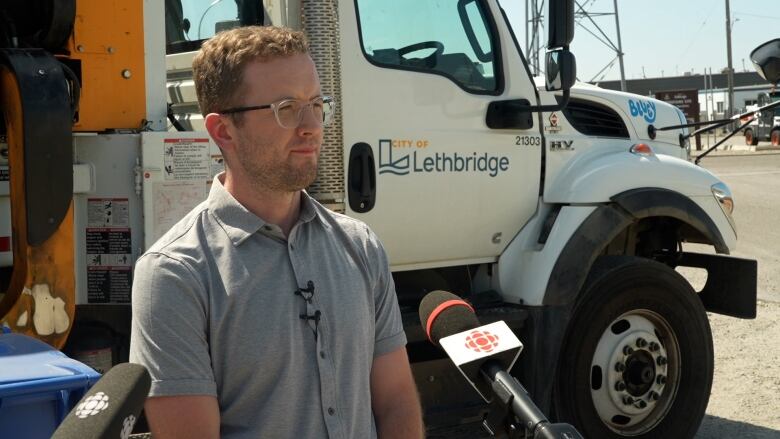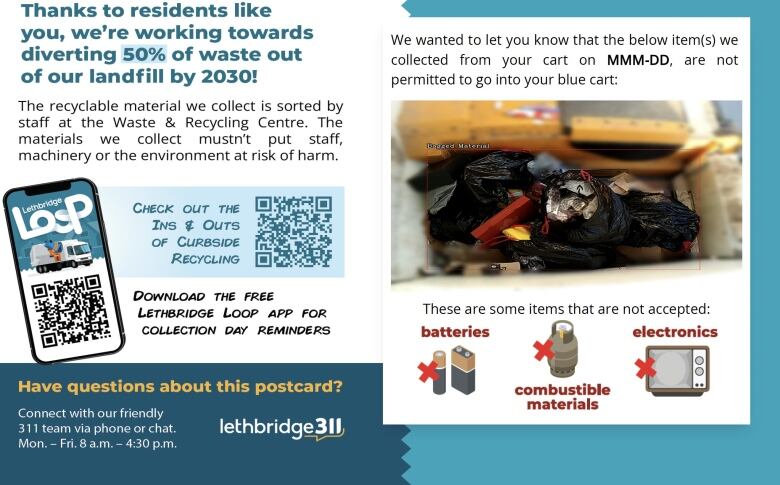Lethbridge using artificial intelligence to curb recycling contamination
Pilot program will cover 25% of the southern Alberta city until spring 2025

City of Lethbridge collections manager James Nicholls says 13 per cent of items that enter the municipality's blue recycling carts don't belong there.
But with the help of artificial intelligence, that number could be lower.
"Any decrease that we see on that end is a success," he said.
This week, the southern Alberta city has mounted three cameras, a GPS and a computer system ontwo of its waste collection trucks that cover 25 per cent of the city.
This is part of a pilot project aimed at reducing contamination, safety concerns and costs.
"We're always looking to kind of prioritize safety and efficiency," said waste and recycling engineer Mark Molesky.
The technology designed by Saskatchewan's Prairie Robotics will use AI to identify materials that shouldn't be there like batteries, glass and yard waste and record the households they came from.
After the information is reviewed by staff, those households will get a postcard with a picture of the errant items and information on where they should be going.

Education themain goal
Nicholls says it's more about education than punishment.
"Most people are doing the right thing. They just need that gentle reminder on a couple items," he said.
The City of Regina was an early adopter of the technology, and Nicholls says Leduc and Medicine Hat in Alberta have started using it recently.
He says Regina showed a significant drop in contamination by sending out reminders.
If education isn't enough for change, repeat offenders could have their bins taken away as a last resort. But Nicholls says that hasn't happened so far.
"We will work with them. We will go and actually visit their household, try and talk to them in person, knock on their door. If they're not actually listening to the letters that we're sending out, we will do everything in our power before we actually consider a step such as removing a cart," he said.

Safety, financial benefits
When refuse is being picked up, teams go ahead of the collection trucks and look through the bins to make sure the items are in the right place.
Molesky says the AI tech would be cheaper and more effective than the current system.
"In comparison to the previous program this is roughly a tenth of the cost per audit. So there's a significant cost savings when you implement this technology," he said.
Nicholls says summer staff that would usually do that work have been assigned to other tasks.
He says the city processes its organics into compost, and recycled materials are processed and sold. Reduced contamination would also mean a more valuable product.

Mixed reaction from residents
The system will blur out personal information automatically.
"If a person happens to be caught in a particular shot or a licence plate is captured in a shot, that imagery is actually blurred out before our staff even see that," said Nicholls.
Still, some residents aren't comfortable with a camera capturing what comes out of their garbage.
"Every week we find somebody else's database gets hacked. So the less they have in the database, the better," said resident Frank De Walle.
Alex Kwan is skeptical about AI but feels like this may be a good use of the technology.
"[if] that makes life easier, where it's not taking away jobs or I guess human connections. I think it's completely fine. So I think the city should go for it," said Kwan.
The pilot project will run until spring 2025. After that, the city will decide on whether or not it will proceed with the technology based on contamination numbers and community perception.












_(720p).jpg)


 OFFICIAL HD MUSIC VIDEO.jpg)
.jpg)



























































































